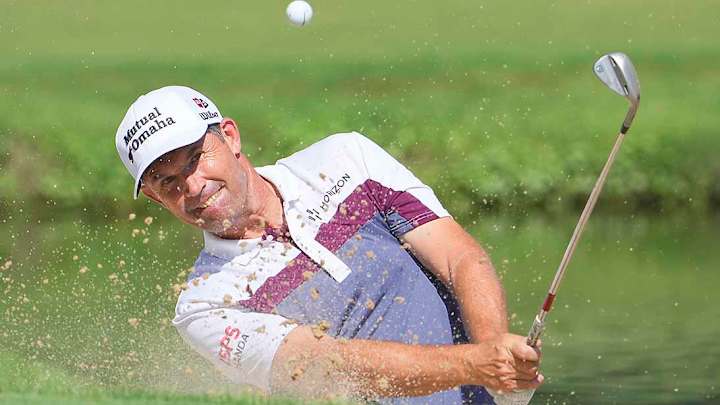Champions Tour Major-Winners Remember What It Takes to Win Majors, As They Play For Another One This Week

BENTON HARBOR, Mich. — We learned last week at the PGA Championship that winning a major championship is just plain hard.
With a field in this week’s Senior PGA Championship that includes 20 career major winners, the Champions tour is filled with players who know how tough it is.
Ireland's Padraig Harrington had a major run of three wins in 14-month span: the 2007-08 Open Championships and the 2008 PGA Championship.
Harrington, 50, believes that winning a major was easier than winning a regular event, and argued that getting yourself in contention at a major is the hard part, but once you have gotten over that hurdle you have a far greater chance of winning a major than any other tournament.
“Turning off the noise the week of a major and not getting lost in the week, keeping yourself in there and doing all the good stuff,” Harrington said of his philosophy, “For me, by the time I won my majors it was inevitable.”
Harrington came close many times but didn’t have a real blueprint. Once he did, Harrington believed that outside of Tiger Woods and Phil Mickelson, he was the next best player.
“My time had arrived,” Harrington said of his major-winning streak. “I couldn't tell you, 'I'm going to win that major.' I couldn't tell you, 'I'm going to win the next major.' But I can tell you, 'I'm going to be in contention.'”
Harrington believed that with a proper approach, he could set himself up to play well three or four times a year and get enough breaks to pick off a major or two.
He also preached the importance of getting comfortable, which takes a lot of time in majors, but eventually came to him.
Once he accomplished the initial goal, his first major title, the next one was much harder.
“There’s very few players who play well after winning a major,” Harrington said. “It comes with a millstone around your neck. Did you justify it? Are you good enough?”
Which is why Harrington believe there are so many one-time major winners.
Retief Goosen won two U.S. Opens and agrees that you must be comfortable, which he defined as controlling your emotions.
“It’s hard on the mind,” Goosen said. “It plays games with you and the more you can be in your own zone – you look at the best players in the world – they’re the strongest in mind.”
A professed grinder, Jerry Kelly never won a major and never treated the four championships different than any other event, mainly because he didn’t have that luxury.
When others were taking time off the tour to play major venues before the championship, Kelly was playing in Milwaukee, the Western Open or the John Deere so he could keep his card.
Kelly also knew his game of extreme aggressiveness likely didn’t work well at major venues, and while he was physically capable, he was not mentally a good fit for them.
“Even when I aimed in the middle, I still moved into the pins.” Kelly said while defining aggressive nature. “You can't do that in majors, I did not have the patience. And then once I started making a bogey or two, I didn't have the patience for that either.”
The idea of treating the four majors like any other event worked for Darren Clarke, the 2011 Open Champion.
Clarke won many of the big events in golf but for most of his career could not get over the hump in majors. He felt he wanted it too much and desire got in his way.
Others might contend that Clarke didn’t do all that was required, as he loved to enjoy life. Instead of hitting the gym, Clarke was more likely found in the local pub.
“I wanted success and career success more than anything. I got in my own way an awful lot of the time and that was my problem,” Clarke said, “Because I felt as if I have enough talent to do better, I've never quite done it.”
Clarke clearly took a different way than many others, but like Goosen and Harrington, had a strong mental approach in 2011 at Royal St. Georges, which was the difference.
“I've had opportunities to win majors before and I was never able to do it and I was getting later in the stage of my career where probably I wasn't going to really win, which I would have found incredibly frustrating,” Clarke said. "Because, I've always thought rightly or wrongly that I was good enough to win at least one.”
David Duval won his Open Championship at Royal Lytham & St. Annes in 2001.
A former World No. 1, Duval was one of the best players in golf during his short career prime, making many major appearances as one of the favorites.
Eventually, after playing in enough majors, Duval like Harrington knew he was good enough to win one, which made winning one all that much easier.
“At some point I realized I didn't need to do anything different than I had been doing,” Duval said. “There wasn't any secret to it. You know, just maybe eliminate that one mistake, maybe eliminate that one missed shot, where you're short-sided yourself, don't do that. It's just that one tiny piece, but it wasn't anything different than what I had been doing.”
